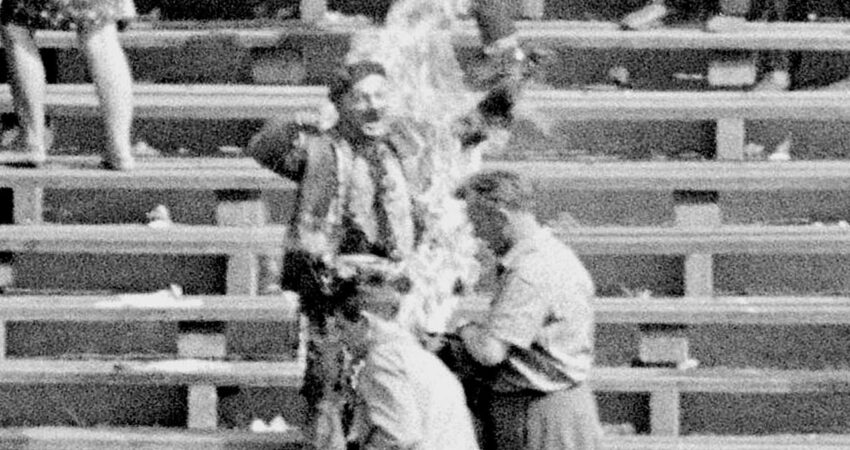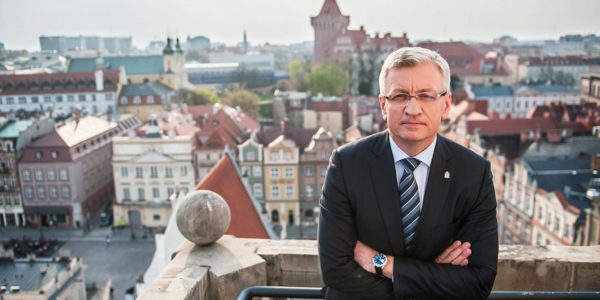By Beata Bruggeman-Sękowska
On September 8, 1968, Ryszard Siwiec committed suicide by public self-immolation in protest against the Warsaw Pact invasion of Czechoslovakia. He set himself on fire during the nationwide harvest festival at the Stadion Dziesięciolecia (stadium) in Warsaw, Poland in the presence of the leaders of the Polish United Workers’ Party, diplomats and 100,000 spectators.
Ryszard Siwiec was the first person from Central and Eastern Europe to self-immolate in protest of the invasion and the communist oppression. Four months later Jan Palach in Prague did the same in protest of communist regime.
‘’Hear my Cry’’
Ryszard Siwiec was born March 7, 1909 in Dębica. During the World War II he joined Polish Home Army and after the war he refused to work as a teacher as he did not want to be part of the communist propaganda machine and started working as a bookkeeper.
He did not tolerate the communist oppressive government and supported protesting students during the March 1968 political crisis in Poland. He was involved in writing and printing various anti-government leaflets under the pseudonym Jan Polak. Before his self-immolation act in Warsaw, he had prepared a will and had recorded an anti-communist message on a tape accusing the Soviet Union of imperialism. The last words were:
‘’People who may still have a spark of humanity and human feelings in them, come to your senses! Hear my cry, the cry of a gray, ordinary man, a son of a nation who loved his own and other people’s freedom above all else, above his own life, come to your senses! It’s not too late!’’
While traveling to Warsaw by train, he wrote a farewell letter to his wife. But it reached her after 22 years later since it was taken over and kept by the Security Service. He wrote:
‘’Dear Maria, don’t cry. It’s a waste of energy, and you’ll need them. I’m sure I lived 60 years for this moment. Sorry, it couldn’t be otherwise. I am dying so that truth, humanity and freedom do not perish, and this is a lesser evil than the death of millions. Don’t come to Warsaw. Nobody can help me anymore. We’re getting to Warsaw, I’m writing on the train, so letters are bent. I feel so good, I feel inner peace like never before in my life.’’
During his self-immolation act he had some anti-communist leaflets and was carrying a banner with the words “For our freedom and yours” and “Honour, Fatherland”. He was shouting ‘’I protest’’ and did not agree to be helped. He was taken to hospital where he died after 4 days. He was all the time under police surveillance. The communist government stated that he was suffering from a mental illness and had serious drinking problems.
Although the act of self-immulation was recorded by photographers and a motion camera, the communist government banned any publications on this subject. Most of the few photographs of the incidents have been destroyed or lost. Ryszard Siwiec identified with the Polish anti-communist movement but his act was his individual act and therefore the opposition did not know about it until much later. The Polish editors of Radio Free Europe found out about the event several days later, but the management thought it was not trustworthy. After the self-immolation of Jan Palach and a new report received from Poland the news of Siwiec’s sacrifice was broadcast in March 1969.
Recognition
In 1981 for the first time , a commemorative book published by Ryszard Siwiec’s family shared publicly the transcript of the message that he had recorded before immolating himself.
In 1991 Polish director Maciej J. Drygas made a film documentary ”Hear my Cry” (Usłyszcie mój krzyk) and a radio programme ”Last Will”(Testament). They were based on the archival documents from the investigation Drygas received, a 7 second long video presenting Ryszard Siwec’s self-immolation he discovered, as well on various testimonials of family and eyewitnesses he collected. In 2003, researchers at the Polish Institute of National Remembrance found new video recordings taken by the Polish secret police.
In 2001 he was awarded the Order of Tomáš Garrigue Masaryk, first class by Václav Havel, President of the Czech Republic. In 2001 Polish President Aleksander Kwaśniewski awarded Ryszard Siwiec with Order of Polonia Restituta, Commander’s Cross. And in 2006 he was awarded the Order of the White Double Cross, 3rd Class by Ivan Gašparovič, President of Slovakia.
There are various memorial plaques dedicated to the memory of Ryszard Siwiec. A street in Prague in the Czech Republic is named after him in front of the Czech Institute for the Study of Totalitarian Regimes, with a nearby memorial. There is also a bridge in Przemyśl, where he lived, named after him. A street in Warsaw adjacent to the new Stadion Narodowy, former Stadion Dziesięciolecia, was named after Ryszard Siwiec and an obelisk was installed in his memory.
Image: Wikipedia Commons
Sources: the article has been published by Central and Eastern Europe Center and is republished with permission
Ryszard Siwiec: first self-immolation against communist oppression



Follow Us!